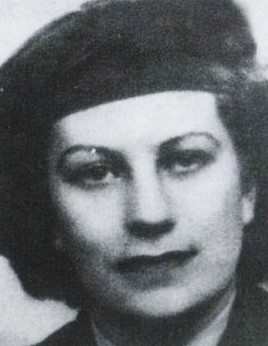Eileen Nearne - Spy in the Shadows
Born: March 15, 1921, London, United Kingdon
Died: September 2, 2010, Torquay, United Kingdom
Eileen Nearne was a British secret agent during World War II who risked her life as a wireless operator in Nazi-occupied France.
On September 2, 2010, the body of 89-year-old Eileen Nearne was discovered in her small apartment in Torquay, Devon. To her neighbors, she seemed like a quiet recluse who loved cats and kept to herself. But when police searched her belongings, they uncovered medals, documents, and records that revealed an astonishing truth: this seemingly ordinary woman had once been a courageous spy for Britain’s Special Operations Executive (SOE) during World War II.
Eileen Mary “Didi” Nearne was born on March 16, 1921, in London, the youngest of four children. Her father was English, and her mother was Spanish. In 1923, the family moved to France, where Eileen grew up fluent in French. When Nazi Germany invaded in 1940, her parents and brothers chose to stay in France, but Eileen and her sister Jacqueline made the dangerous journey back to England. Traveling through Spain, Portugal, and Scotland, they finally reached London in 1942.
In London, the sisters were offered work with the Women’s Auxiliary Air Force, but Eileen declined. Because of her language skills, she was recruited by the SOE, Britain’s secret wartime agency. At first, she worked in England as a signals operator, transmitting messages from agents in the field. Unknown to her, both Jacqueline and her brother Francis had also joined the SOE. Soon, though, Eileen was called for duty in occupied France.
On March 2, 1944, Eileen parachuted into France for “Operation Mitchel.” Using the cover names Mademoiselle du Tort and Jacqueline Duterte, and the codename “Rose,” she served as a wireless operator for the Wizard Network in Paris. Her mission was to send coded radio messages to London, raise funds, and keep communication lines open for the Resistance.
Her work was dangerous. The Germans used radio-tracking equipment to locate hidden transmitters, and captured operators were often tortured and killed. To avoid detection, Eileen constantly moved from one safe house to another. She narrowly escaped exposure when a German soldier offered to carry her suitcase, unaware it held her transmitter. Quick-thinking, she told him it was a gramophone and got off the train at the next stop.
By July 1944, Eileen had sent 105 messages back to London, many helping the Allies prepare for D-Day. But on July 21, her luck ran out. Shortly after transmitting a message, the Gestapo stormed her safe house. She burned her notebook and hid what she could, but they found her radio. Arrested and interrogated, she endured brutal torture. Eileen later described being stripped, beaten, insulted, and nearly drowned in icy water, yet she refused to reveal her network. Instead, she stuck to her cover story, insisting she was just a naïve Frenchwoman helping a businessman with messages she didn’t understand.
After her capture, she was deported to Ravensbrück concentration camp, infamous for its harsh conditions. Her head was shaved, and she was forced into hard labor. Later, she was sent to a camp near Leipzig, where she worked long hours repairing roads. In early 1945, she managed to escape with two French women and eventually encountered American troops. At first, they suspected she was a German spy and detained her with captured SS officers. Only after her identity was confirmed by London was she released.
After the war, Eileen gave interviews to the BBC and SOE debriefers, describing her ordeal. When asked how she survived such horrors, she replied: “The will to live. Willpower. That’s the most important. You should not let yourself go… I always believed in destiny, and I had a hope.”
For her courage, Eileen Nearne was awarded the French Croix de Guerre and was made a Member of the Order of the British Empire by King George VI. Yet, despite her bravery, she never sought the spotlight. She lived quietly in England, never marrying, and rarely speaking about her wartime service.
Her death in 2010 might have passed unnoticed if not for the discovery of her secret past. Instead, she was honored with a hero’s funeral, attended by military representatives and strangers who came to pay tribute.
Eileen Nearne’s story reminds us that history’s greatest heroes often live in silence. She risked everything for freedom, endured unthinkable suffering, and carried her courage quietly for the rest of her life.
References:
“Eileen Nearne - British WWII Heroine.” TogetherWeServed Blog, 8 May 2024, blog.togetherweserved.com/eileen-nearne-british-wwii-heroine/.
Russell, Shahan. “The Rose - SOE Agent Eileen Nearne Survived the Gestapo & Helped Expose V-1 Rockets: War History Online.” Warhistoryonline, 9 Aug. 2019, www.warhistoryonline.com/instant-articles/eileen-nearne-rose-soe-agent.html.
Key words:
Wartime, Justice, Courage, Perseverance, Freedom, Responsibility, Take Risks for Others, Stand Up for Your Beliefs
Explore ARTEFFECT projects about this Unsung Hero:
Eileen Nearne Artworks

